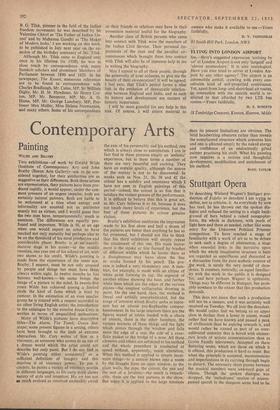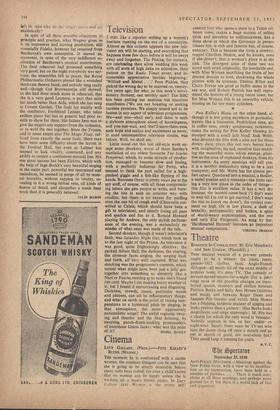Stuttgart Opera
IN describing Wieland Wagner's Stuttgart pro- duction of Fidelio as decadent I am trying to define, not to criticise, it. As everybody by now has read, he has thrown out the spoken dia- logue and reduced the setting to a single back- ground of bars behind a raised saucer-plat- form, the whole in darkness, with pools of light here and there as needed, rather like some entry for the Unknown Political Prisoner competition. To have reached a stage of familiarity with a work of art as to be driven to seek such a degree of abstraction, a stage when essential links in the narrative upon which the whole imaginative structure is built are regarded as superfluous and discarded as a distraction from the pure aesthetic essence of the work, is surely the very model of deca- dence. It assumes, naturally, an equal familiar- ity with the work in the public it is designed for, and here perhaps Wagner is optimistic. Things may be different in Stuttgart, but prob- ably nowhere to the extent that this production demands.
This does not mean that such a production will not be a success, and it was certainly well received on Tuesday. We all love the decadent. We would rather feel we belong to an upper class in decline than a lower in ascent, would rather feel we have known and passed a peak of civilisation than be aspiring towards it, and would rather be treated as part of an over- cultivated minority that is bored with elemen- tary levels of artistic communication than as Grove Family televiewers. Accepted on these flattering terms, which are those on which it is offered, this production is hard to resist. But when the principle is accepted, inconsistencies and imperfections in its carrying through begin to disturb. The necessary short pauses between the musical numbers were awkward gaps of silence. Though the spoken dialogue was dropped, the 'melodrama' section of accom- panied speech in the dungeon scene had to be left in. And why let the singer, 1»to.e and act realistically?
In spite of all these possible objections of principle and practice, what Wagner gives us is an impressive and moving production, still essentially Fidelio, however far removed from Beethoven's own conception. It moved us, moreover, in spite of the very indifferent re- alisation of Beethoven's musical contribution. The final rehearsal had promised something very good, but on the night everybody was ner- vous, the ensembles fell to pieces, the Royal Philharmonic Orchestra played like a wretched third-rate theatre band, and nobody sang really well—though Gre Brouwenstijn still showed, as she had done much more in rehearsal, that she is a very good Leonora, a part that suits her much better than Aida, which she has sung at Covent Garden. The fault lay mainly with the conductor, Ferdinand Leitner, who takes endless pains but has in general had poor re- sults to show for them. His failure here was to give the singers any support from the orchestra, or to weld the two together. Since the Tristan, and to some extent also The Magic Flute, suf- fered from exactly the same fault, there may have been some difficulty about the layout in the Festival Hall, but even so Leitner has seemed to lack vitality, command, and any ability to sustain a continuous musical line. His one great success has been Elektra, which with the help of Inge Borkh's very beautiful singing in the name part, powerful but unstrained and melodious, he seemed to purge of all its musi- cal brutality, without sapping its vitality, re- vealing in it a strong lyrical vein, all kinds of finesse of detail, and altogether a much finer work than it is generally believed.
COLIN MASON

































 Previous page
Previous page